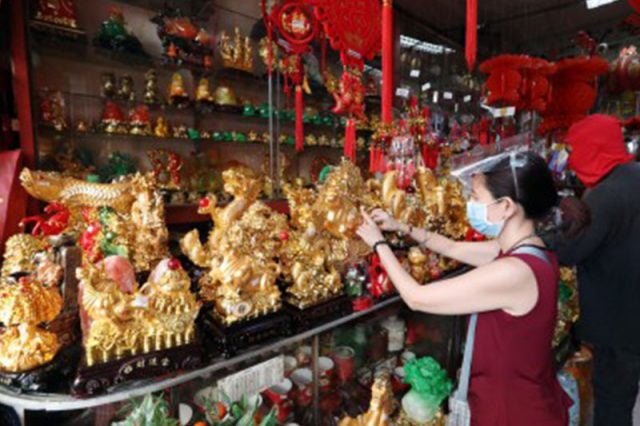
As the Chinese New Year draws close, the health department listed down safe activities to celebrate the holiday and reduce the risk of COVID-19 transmission.
The Spring Festival will be held on the first of February but unlike in the previous years, tradition and festivities in Binondo, Manila, will be postponed for the second time this year due to the threat of the coronavirus, particularly the Omicron variant.
Manila Mayor Isko Moreno on Wednesday canceled all public activities in connection with the Chinese New Year festivities from January 31 to February 1 in the nation’s capital.
Binondo, the Chinatown Manila, usually hosts revelries associated with the holiday which includes gatherings, dragon dances, and firework displays on Chinese New Year’s eve and the Lunar New Year holiday.
Safe activities
The Department of Health said that the Filipino-Chinese community can celebrate this year’s Chinese New Year safely through the following:
Eating tikoy at home
Filipinos can eat their “tikoy” or traditional Chinese sweet rice cake at the comfort and safety of their own homes instead of going out in restaurants or in other places.
Giving angpao electronically
Also known as “red envelope,” elders can give their children the coveted red packet through e-wallets like GCash and PayMaya or through banking apps.
An angpao contains cash and is usually given to children during special occasions.
Sending food to relatives
For everyone’s safety, celebrants are recommended to send food to their relatives through food delivery services of apps and restaurants.
The DOH included this as an alternative to eating out or gathering at other relatives’ houses.
Enjoy fireworks from home
Families can enjoy the spirit of the Lunar New Year by watching firework displays in their community at the comforts of their home instead of going out.
Firework spectators usually gather to a place to view the display of lights without obstructions but the health agency said that it is safer to stay at home to prevent COVID-19 transmission.
Have home movie marathons
DOH also suggested holding movie marathons at home. It advised the public to watch their favorite Chinese movies or dramas instead of physically going out to malls.
Hold online reunions through video calls
The public can also maximize the use of technology and hold virtual gatherings through teleconferencing platforms like Zoom or messaging apps like Facebook Messenger instead of meeting up with other people in person.
The health agency similarly suggested this idea during the Yuletide season, when Filipinos are accustomed to holding big family reunions.
READ: DOH gives tips on how to keep Christmas parties COVID-safe
It also discouraged buffet setups and recommended the public to prepare and enjoy set meals to prevent the risk of COVID-19 infection.
Risky activities
The DOH said that the following activities are considered high-risk in terms of COVID-19 transmission:
- Physically going to Chinatown
- Joining meal gatherings or Chinese lauriats with relatives and friends
- Watching lion or dragon dances in crowded places
- Visiting elderly relatives, who are at greater risk of catching severe COVID-19.
On the other hand, these are what the health agency considers medium-risk activities:
- Physically shopping for fruits and other food in groceries or supermarkets in anticipation of the holiday
- Visiting temples
President Rodrigo Duterte earlier declared February 1, Chinese New Year, as a special non-working holiday.









